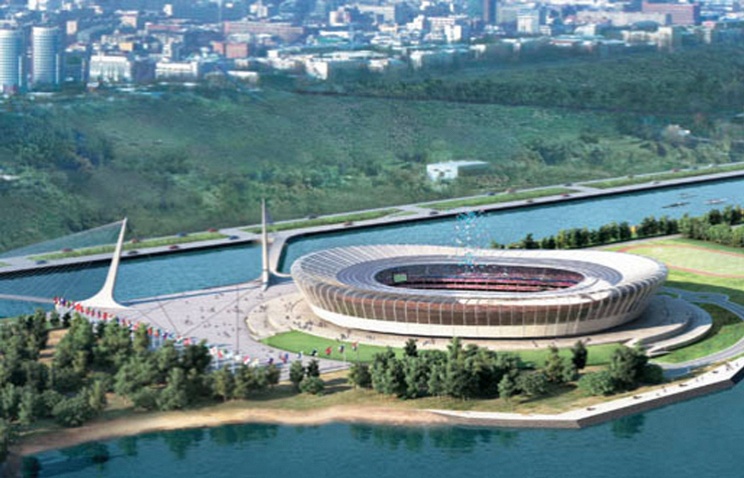May 18 – Russian stadium construction for 2018 is ahead of schedule and the stadia will be delivered in advance of deadlines, according to officials in Nizhniy Novgorod and Kaliningrad. The two cities are both building new stadiums for the World Cup.
The Volga Arena in Nizhniy Novgorod will be completed two months ahead of the scheduled date, said Valery Shantsev, the governor of the Nizhny Novgorod Region. “The stadium’s ahead-of-the-schedule construction will allow us to focus on higher quality preparations for hosting the matches of the international football championship.”
He said the stadium will be “completed not in November of 2017, as it was initially planned, but in September of 2017.”
Nizhny Novgorod is spending a total of 77.6 billion rubles ($1.6 billion) on World Cup 2018 preparations with 19 billion rubles ($388 million) allocated from the federal budget for the construction of the Volga Arena, a new Customs Service’s building, reconstruction of the Dinamo stadium as well as the upgrading of the local airport’s landing stripe.
A further 58.6 billion rubles ($1.2 billion) is being spent via a regional financing programme for the construction of 50 more sports facilities, which include housing and training sites, reconstruction of the local airport and the construction of a new subway station.
Construction of the 35,000 capacity stadium on Kaliningrad’s Oktiabrskiy island could start in July this year, according to the governor Nikolay Ciukanov who said there will be no problem in delivering the stadium by the end of 2017.
Currently general contractor Crocus Group is finishing project planning while ground work is being done on Oktiabrskij island – works are completed for 22 hectares but 44 more hectares still have to be completed. The total area of construction will be 140 hectares and includes public park areas.
The final plans will be subjected to government review by June 1, with construction on the stadium proper expected to begin in July with completion by November 2017.
Following the World Cup the stadium will be transformed to the multiple-function cultural and busness complex, with a 25,000 capacity arena, hotels, fitness and conference centres, as well as offices.
Contact the writer of this story at moc.l1745050008labto1745050008ofdlr1745050008owedi1745050008sni@n1745050008osloh1745050008cin.l1745050008uap1745050008

